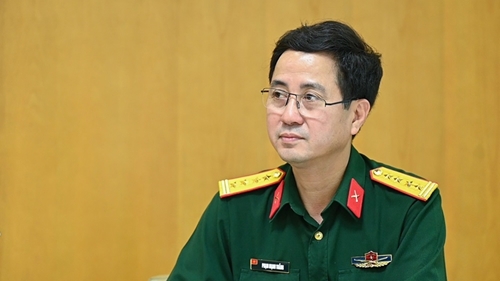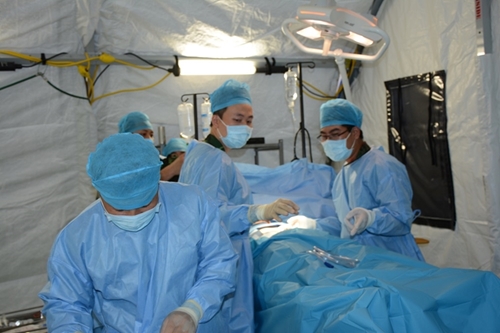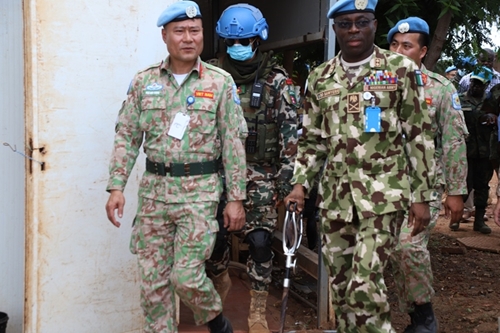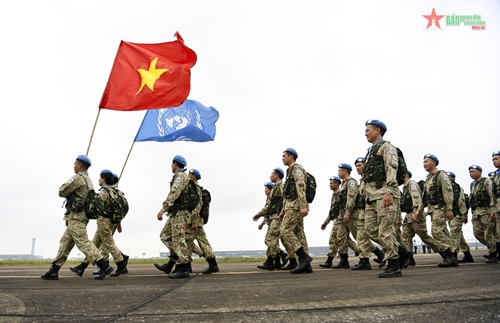    |
 |
|
Senior Colonel Pham Manh Thang, Director of the Vietnam Department of Peacekeeping Operations |
In an exclusive interview granted to the People’s Army Newspaper Online, Colonel Thang recalled first days when the Vietnam Peacekeeping Center was founded (May 27, 2014) and then upgraded into the Vietnam Department of Peacekeeping Operations (2018).
The upgrade was an inevitable trend and Vietnam’s participation in U.N. peacekeeping operations has helped realize the country’s policy of deeper international integration, especially in terms of defense relations. The upgrade, according to the department leader, created favorable conditions in various aspects, including the building of legal basis for peacekeeping operations of the armed forces.
    |
 |
|
Pre-deployment training is one of the important tasks to ensure the good task performance of Vietnamese peacekeepers in U.N. missions. |
He pointed four advantages in deploying the peacekeeping force of Vietnam. They included the attention from the Party, State, Central Military Commission and Ministry of National Defense’s leaders; the support from ministries, departments, and the Inter-sectoral Group and the Steering Board of the Ministry of National Defense on participation in U.N. peacekeeping operations; the assistance and readiness of units to provide competent troops for the force; and the building of a contingent of good officers to be deployed in both individual and unit forms.
Actually, deploying a new force and engaging in a new field have posed numerous challenges. According to Colonel Thang, the first one is the command of foreign language. Each officer deployed to U.N. mission must get 5.5 and above in IELTS band score. The second one is the health condition since peacekeepers work in a multinational environment, in a new place with many challenges in security and diseases. Thirdly, this is the unevenness in officers’ qualifications; thus after training sessions, the best in competency and virtues are selected to take on the noble tasks. The last challenge is the far-from-home and disadvantaged working place that partly affects the feelings of deployed forces, especially servicewomen.
However, with high determination and spirit of readiness to undertake missions, deployed officers have well performed their duties and felt at ease to work.
    |
 |
|
Commanding Officer of the Engineering Company Rotation 1 Mac Duc Trong (left) (present VNDPKO Deputy Director with Sr. Col. ranking) welcomes UNISFA Force Commander at the company’s barracks. (Photo credit of the Engineering Company Rotation 1) |
Regarding the training for Vietnamese peacekeepers before being deployed to U.N. missions, Col. Thang said that they undergo sixth-month training at their units and three-month pre-deployment training at the VNDPKO. Apart from their professional expertise, Vietnamese officers are equipped with knowledge of U.N. peacekeeping, international law, Humanitarian Law, regulations of the countries they are deployed to, Vietnam’s law, the U.N.’s regulations, among others. Attentively, many training sessions have drawn the participation of international instructors and some have been opened abroad to help Vietnamese officers, especially those deployed in an individual form, to improve their expertise.
Col. Thang proudly underlined that in June 2018, the U.N. officially recognized the Vietnam Department of Peacekeeping Operations as one of the four competent international training centers in the region with training under the Triangular Partnership Program (TPP).
As of May this year, Vietnam has deployed more than 800 officers to U.N. missions, including 114 individual officers, an impressive number. Individual officers work as senior officers, staff officers, supply officers, signal officers and civilian-military cooperation ones. Vietnam also has its officers working at U.N. headquarters in New York. Notably, the rate of servicewomen is high, reaching 16.6 per cent. In addition, Vietnam has two peacekeeping units, including a 63-strong level-two field hospital (L2FH) and a 184-strong engineering company.
    |
 |
|
The see-off ceremony for the Engineering Company Rotation 1 and the L2FH Rotation 4 on April 27, 2022 |
The VNDPKO director said that in September this year, the L2FH Rotation 6 will be deployed to Bentiu, South Sudan, and the Engineering Company Rotation 3 will take on missions in Abyei.
Translated by Mai Huong